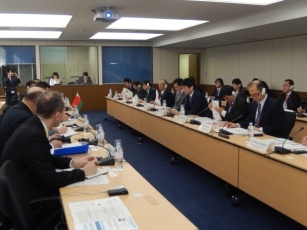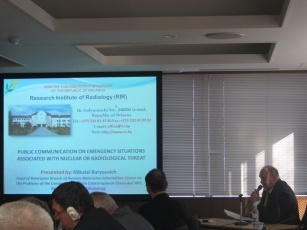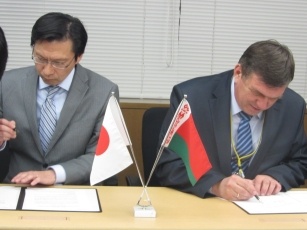Press Releases
Second Meeting of the Japan-Belarus Joint Committee for the Cooperation to Advance Aftermath Response



1. On March 30, the second meeting of the Japan-Belarus Joint Committee for the Cooperation to Advance Aftermath Response was held in Tokyo. The Joint Committee met for the first time in Minsk, Belarus in July 2013 based on the “Agreement between the Government of Japan and the Government of Belarus concerning Cooperation to Advance Aftermath Response to Accidents at Nuclear Power Stations” concluded between Japan and Belarus in December 2012. This was the second meeting of the Joint Committee.
2. From the Japanese side, Mr. Kentaro Sonoura, Parliamentary Vice-Minister for Foreign Affairs, gave an opening address, and a total of 25 officials from the Ministry of Foreign Affairs; the Reconstruction Agency; the Secretariat of the Nuclear Regulation Authority; the Ministry of the Environment(MOE); the Ministry of Agriculture, Forestry and Fisheries(MAFF); the Ministry of Education, Culture, Sports, Science and Technology(MEXT); Nagasaki University; and Tokyo Electric Power Company; headed by Mr. Akira Muto, Deputy Director-General, European Affairs Bureau, MOFA, attended. From the Belarusian side, a total of eight officials from the Ministry for Emergency Situations of the Republic of Belarus; the National Academy of Sciences of Belarus; and the Embassy of Belarus in Tokyo; headed by Mr. Vladimir Chernikov, Chief of the Department of Mitigation of the Consequences of the Catastrophe at the Chernobyl NPP, Ministry for Emergency Situations of the Republic of Belarus, attended.
3. At the meeting, discussions mainly revolved around the following agenda items and views were exchanged on issues such as the current condition of the nuclear power plant after the accident, and future policy.
- Reconstruction efforts
- Radiation countermeasures, decontamination
- Food safety
- Human resources development, scientific cooperation, joint development.
4. From the Belarusian side, measures taken in the past 29 years concerning each of the agenda items and current problems were explained based on the experience from the Chernobyl Nuclear Power Station accident, and a proactive stance was expressed toward cooperating with specialized Japanese institutions in a wide range of fields, including food monitoring and agrochemicals. From the Japanese side, progress in recovering from the Great East Japan Earthquake and the Fukushima Daiichi Nuclear Power Station accident and the current situation were explained; Japanese technologies and initiatives concerning radiation monitoring and decontamination technologies were introduced; and the both sides shared the view that information sharing and joint research between the two countries will be advanced further going forward.

